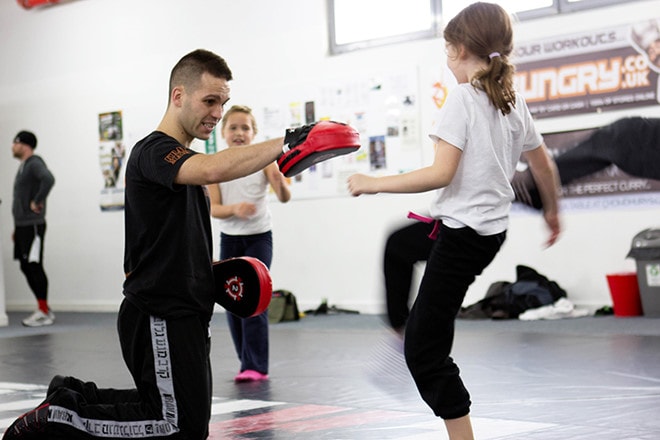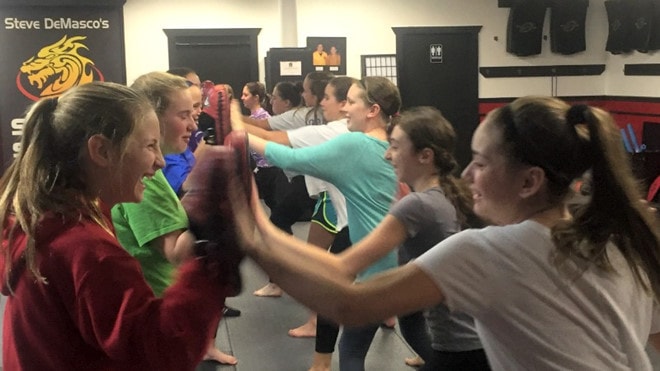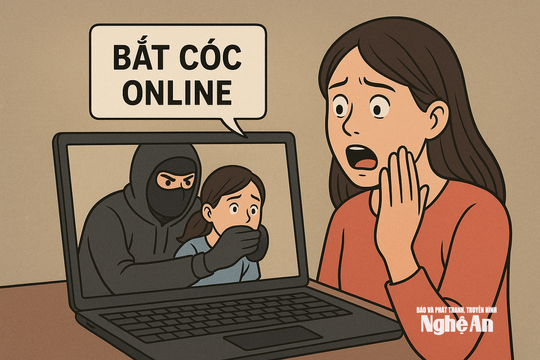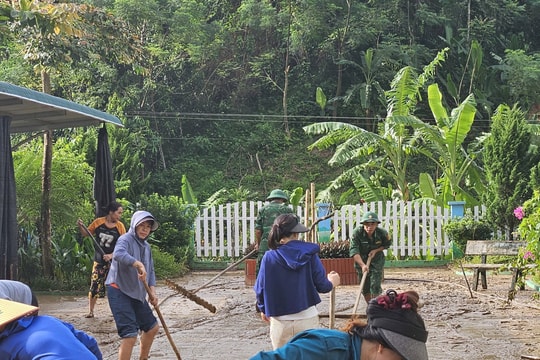Many countries want to teach self-defense skills to students.
In the context of increasing violence, many countries want to teach self-defense skills in schools, but no place has made it a compulsory subject.
The recent knife attack in Russia caused public outrage when two former students returned to their school to attack their teacher in the classroom. Nine people were injured, including teacher Natalia Shagulia and eight 10-year-old students.
According toExpress, some students were injured when they rushed to protect the teacher from the aggressive attackers. Meanwhile, Ms. Shagulia also risked her life to rush towards the two attackers to protect her students.
"My son was able to escape thanks to the teacher pushing the attacker and creating an opportunity for some male students to run outside," an anonymous parent informed.Daily Mail.
|
| Many researchers believe that teaching children self-defense skills helps them become more confident in life. Photo:No Fear Academy. |
On social networks, besides comments criticizing the attacker, many people praised the bravery of Ms. Shagulia and the 10-year-old students.
"Let's all pay tribute to the teacher who risked her life to protect the children. Hope everyone is safe after this serious attack," Lynsey Peters wrote.
In addition, many other opinions expressed concern about similar incidents that could happen and said that schools should teach children self-defense skills in school.
"What you learn in school helps you overcome difficulties in life and self-defense is one of the important skills that many people lack. I don't want to hurt anyone, but I also don't want to end up in the hospital because I don't know how to protect myself from violent people," Darnell Landau said.
Many self-defense classes but not popular
In fact, in many countries such as the US, Japan and India, teaching self-defense skills to children has appeared in many forms such as classes of non-governmental organizations, paid classes, classes in schools or clubs. However, nowhere has teaching these skills been made a compulsory subject.
In China, school violence has occurred frequently in recent years. According toGlobal Times, students in the world's most populous country lack awareness of basic self-defense. Even their families and schools do not mention it.
Many people believe that it is time for China to teach self-defense skills to children. Knowing self-defense skills is extremely important for a child's development during his school days. It can also help children adapt to the complex society later on. However, the discussion so far has only remained on paper.
Self-defense classes have been around for a long time in the United States, but most of them are paid. One class in Missouri has been around for 20 years, and at times, the class has had as many as 30 students.
Students come here twice a week to learn and practice basic skills. The cost of a course is about 248 USD.
Meanwhile, in India, as schoolgirls are becoming targets of criminals, authorities in some places like Burdwan city have ordered self-defense skills to be taught to schoolgirls.
According toThe Times of India, female students are taught at least 15 self-defense skills, from escaping from restraints, as well as Judo and Karate. The program has been in place since 2015.
|
| A self-defense class for young women in the South Salem area, New York (USA). Photo:Steve DeMasco. |
Professor Aaron Banks, from Custavus Adolphus University, said that children who know self-defense skills will be more confident in life and take decisive actions when in difficult situations, reducing the possibility of danger. In addition, learning these skills also helps them increase their ability to cooperate, especially when children practice with others.
Statistics show that more than 767,000 students in the US between the ages of 12 and 18 are involved in violence. In addition, 67% of victims of abuse are children under 18 years old.
Studies show that teenage victims often shy away from contact and continue to be the target of bullying. Self-defense not only provides protection but also teaches prevention strategies, stopping violence before it occurs.
During the training phase, students will learn skills to defend against malicious actions such as punching, kicking, pulling, holding, using guns or knives, said Dr. Gong Chen at San Jose State University, a self-defense expert.
They are also taught how to effectively escape from bad situations. Furthermore, results show that students can improve their self-defense skills after just one course.
Specifically, children improved 39.5% in handling punches and kicks from an opponent. 53% in maintaining balance when an attacker tried to push them. 81.3% in escaping from a hold. 46.8% in resisting knife attacks.
Furthermore, students can increase their chances of escaping violent confrontations. In fact, self-defense saves 59.6% of students from violent crime, 63.3% from rapists, and 60.5% from other attacks.
Additionally, according to Dr. Chen’s research, children who participate in self-defense classes tend to be less violent than those who do not. However, a group of critics argue that teaching children self-defense increases the number of cases that are resolved by violence instead of reporting to teachers. They believe that teaching self-defense skills in schools does more harm than good.
"Who can guarantee that bullies don't take similar self-defense classes? This puts students in more danger," said an anonymous person.
According to this person, many students will take advantage of these skills to fight against others, even for bad purposes. Besides, another opinion shared that letting children learn self-defense sometimes endangers themselves as well as others. Children can get injured while learning or practicing. They can also hurt others or damage property.





.jpg)




